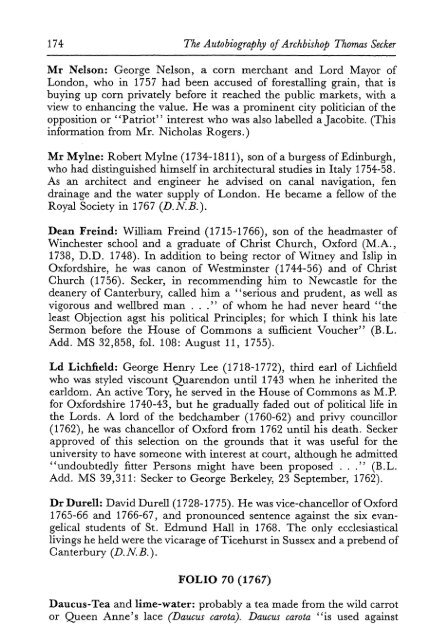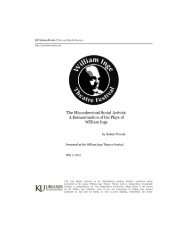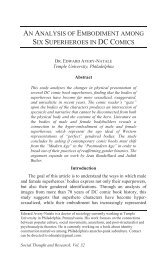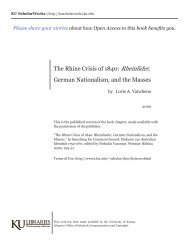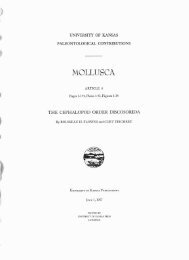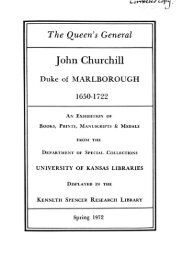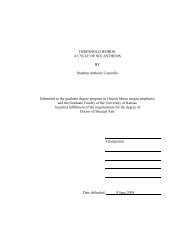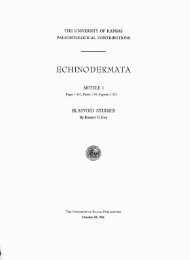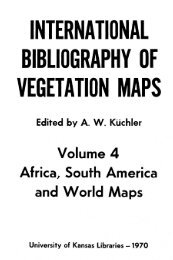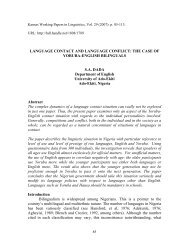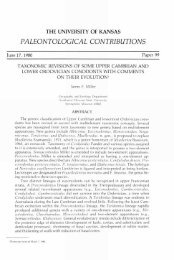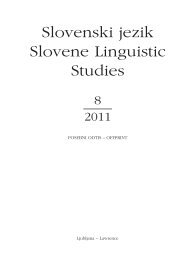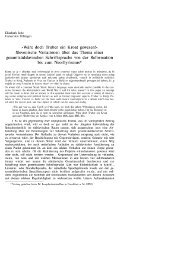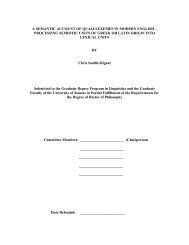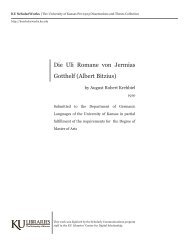Archbishop of Canterbury - KU ScholarWorks - The University of ...
Archbishop of Canterbury - KU ScholarWorks - The University of ...
Archbishop of Canterbury - KU ScholarWorks - The University of ...
You also want an ePaper? Increase the reach of your titles
YUMPU automatically turns print PDFs into web optimized ePapers that Google loves.
174 <strong>The</strong> Autobiography <strong>of</strong> <strong>Archbishop</strong> Thomas Seeker<br />
Mr Nelson: George Nelson, a corn merchant and Lord Mayor <strong>of</strong><br />
London, who in 1757 had been accused <strong>of</strong> forestalling grain, that is<br />
buying up corn privately before it reached the public markets, with a<br />
view to enhancing the value. He was a prominent city politician <strong>of</strong> the<br />
opposition or "Patriot" interest who was also labelled a Jacobite. (This<br />
information from Mr. Nicholas Rogers.)<br />
Mr Mylne: Robert Mylne (1734-1811), son <strong>of</strong> a burgess <strong>of</strong> Edinburgh,<br />
who had distinguished himself in architectural studies in Italy 1754-58.<br />
As an architect and engineer he advised on canal navigation, fen<br />
drainage and the water supply <strong>of</strong> London. He became a fellow <strong>of</strong> the<br />
Royal Society in 1767 (D.N.B.).<br />
Dean Freind: William Freind (1715-1766), son <strong>of</strong> the headmaster <strong>of</strong><br />
Winchester school and a graduate <strong>of</strong> Christ Church, Oxford (M.A.,<br />
1738, D.D. 1748). In addition to being rector <strong>of</strong> Witney and Islip in<br />
Oxfordshire, he was canon <strong>of</strong> Westminster (1744-56) and <strong>of</strong> Christ<br />
Church (1756). Seeker, in recommending him to Newcastle for the<br />
deanery <strong>of</strong> <strong>Canterbury</strong>, called him a "serious and prudent, as well as<br />
vigorous and wellbred man ..." <strong>of</strong> whom he had never heard "the<br />
least Objection agst his political Principles; for which I think his late<br />
Sermon before the House <strong>of</strong> Commons a sufficient Voucher" (B.L.<br />
Add. MS 32,858, fol. 108: August 11, 1755).<br />
Ld Lichfield: George Henry Lee (1718-1772), third earl <strong>of</strong> Lichfield<br />
who was styled viscount Quarendon until 1743 when he inherited the<br />
earldom. An active Tory, he served in the House <strong>of</strong> Commons as M.P.<br />
for Oxfordshire 1740-43, but he gradually faded out <strong>of</strong> political life in<br />
the Lords. A lord <strong>of</strong> the bedchamber (1760-62) and privy councillor<br />
(1762), he was chancellor <strong>of</strong> Oxford from 1762 until his death. Seeker<br />
approved <strong>of</strong> this selection on the grounds that it was useful for the<br />
university to have someone with interest at court, although he admitted<br />
"undoubtedly fitter Persons might have been proposed . . ." (B.L.<br />
Add. MS 39,311: Seeker to George Berkeley, 23 September, 1762).<br />
Dr Durell: David Durell (1728-1775). He was vice-chancellor <strong>of</strong> Oxford<br />
1765-66 and 1766-67, and pronounced sentence against the six evangelical<br />
students <strong>of</strong> St. Edmund Hall in 1768. <strong>The</strong> only ecclesiastical<br />
livings he held were the vicarage <strong>of</strong> Ticehurst in Sussex and a prebend <strong>of</strong><br />
<strong>Canterbury</strong> (D.N.B.).<br />
FOLIO 70 (1767)<br />
Daucus-Tea and lime-water: probably a tea made from the wild carrot<br />
or Queen Anne's lace (Daucus carota). Daucus carota "is used against


